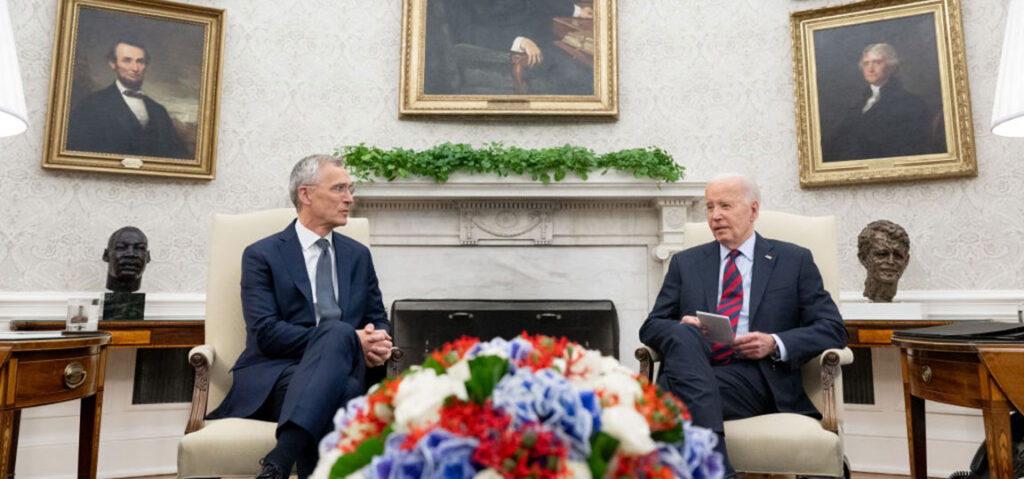NATO Secretary-General Jens Stoltenberg and U.S. President Joe Biden discuss recent increases in spending among nearly all NATO members since Russia’s 2022 invasion of Ukraine during Stoltenberg’s June 2024 visit to Washington, D.C. AFP/GETTY IMAGES
THE WATCH STAFF
Former Russian President Dimitry Medvedev urged fellow Russians to inflict “maximum harm” on Western countries’ infrastructure and daily life to retaliate for increasingly effective sanctions imposed by the West on Russia for its 2022 invasion of Ukraine. Medvedev, now the deputy chairman of Russia’s Security Council, wrote an incendiary post on the messaging app Telegram. Medvedev has 1.3 million followers on his channel, according to Reuters.
“We need to (respond). Not only the authorities, the state, but all our people in general. After all, they — the U.S. and its crappy allies — have declared a war on us without rules. Every day we should try to do maximum harm to those countries that have imposed these restrictions. Harm their economies, their institutions and their rulers. Harm the well-being of their citizens, their confidence in the future,” his post read.
It’s not the first example of extreme Russian rhetoric following the country’s invasion of Ukraine, which prompted heavy sanctions from the U.S. and its allies and partners. Shortly after, Finland and Sweden joined NATO and Russia threatened “counter measures.” The threat came amidst a series of provocative events in NATO’s northern flank, including the cutting of undersea gas and communication cables, most likely by a ship linked to Russia in 2023, an act which Finland characterized as retaliation for its accession to the transatlantic alliance. Sweden has also expressed concerns about Russian involvement in the Baltic Sea sabotage. The case remains under investigation and Russia denies all involvement. Russia also is accused by Finland of facilitating the arrival of hundreds of unauthorized migrants at Finland’s border following its successful NATO bid. Finland responded by closing its land border with Russia, the longest in Europe. In June 2024, media reports surfaced of a Russian spy fleet in the North Sea gathering intelligence on Norwegian infrastructure. Russia also has essentially exited the Arctic Council, an advisory and scientific body designed to keep the Arctic non-militarized and free from conflict.
These actions have often been accompanied by fiery rhetoric from the Kremlin. Whatever the desired effect, the result has been a marked increase in defense spending among NATO allies. Recently, NATO Secretary-General Jens Stoltenberg announced that 23 of 32 member nations have met the organization’s goal of spending 2% of their gross domestic product on defense this year. That’s triple the number from 2021.
Denmark, Norway, Sweden and Finland have all announced major increases in their military budgets, including the purchase of long-range drones, maritime surveillance helicopters, new naval frigates and Arctic craft and other systems able to defend NATO’s northeastern flank and the Arctic approaches to North America. Canada, too, has committed to a major overhaul of its Armed Forces over the next 20 years, especially in its ability to protect and monitor its Arctic territories. The NATO allies have not been shy about explaining the reasons for their new positions: an aggressive Russia. Decades of non-alignment in the Nordic countries was discarded after the Ukraine invasion, replaced by a strategic plan to bolster defenses and integrate commands, especially in air and sea.
Medvedev, who was president of Russia between 2008 and 2012, said Russia should weaponize space and arm the West’s enemies. “Are they screaming about our use of fake news? Let’s turn their lives into a crazy nightmare in which they can’t distinguish wild fiction from the realities of the day, infernal evil from the routine of life,” he wrote, according to Reuters.
Medvedev’s rant came amid new U.S. sanctions in June 2024, which damaged the Russian ruble after the country’s leading exchange was forced to stop trading in U.S. dollars and euros, “obscuring access to reliable pricing for the Russian currency,” Reuters reported. Other new U.S. measures included targeting China-based firms selling semiconductors to Moscow and a move to raise “the risk of secondary sanctions for foreign financial institutions that deal with Russia’s war economy,” effectively threatening them with losing access to the U.S. financial system, the international wire service reported.
Stoltenberg visited Washington, D.C., in June 2024 to meet with U.S. President Joe Biden. During the talks, he publicly praised the rapid uptick in military spending among NATO members, a goal for the July 2024 NATO summit. “Just five years ago, there was still less than 10 allies that spent 2% of GDP on defense,” Stoltenberg said, according to CNN. “I can only now reveal that this year, more than 20 allies will spend at least 2% of GDP on defense … This is good for Europe. And good for America.”

